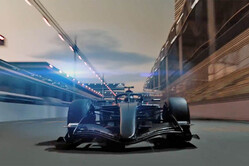


01/07/2025
NEWS STORY
 "We're still some way off," admits Cadillac team boss Graeme Lowdon in terms of driver line-up whilst giving insight to the inspiration behind the team's structure.
"We're still some way off," admits Cadillac team boss Graeme Lowdon in terms of driver line-up whilst giving insight to the inspiration behind the team's structure.
Other than the speculation linking Sergio Perez with the new, General Motors backed outfit, last week Valtteri Bottas offered his own little teaser, then there is talk of Mick Schumacher and Sergio Perez.
However, Lowdon insists that a decision is still some way off.
"Nothing's decided yet," he said at the team's new Silverstone base. "We know who's on the market. We've got a good idea of what we need. But we're still some way off reaching that stage.
"A new team in its first year of racing would benefit hugely from people who are experienced," he admits, though it is widely believed that IndyCar star Colton Herta is on the team's 'want list' if not for the debut season.
While the driver line-up remains undecided, Cadillac has been busy signing up the 'behind the scenes' talent it requires, though it remains around 200 off its target of a 600-strong workforce.
The team only received the official green light a couple of months ago and other than the huge task of preparing for its debut season - which also witnesses one of the biggest overhauls of the regulations in living memory - the team is split between two continents.
Lowdon admits that the team has drawn inspiration from an improbable source.
"It's highly modelled on the Apollo project," he says. "It's very similar. OK, we're not putting a man on the moon, but it feels like it sometimes. If you look at the task in hand, we've got immovable deadlines. We've got a massive necessity for peer-to-peer interaction.
"So we need engineers talking to engineers. We need an engineer here talking to an engineer in Charlotte and another one in Warren, Michigan, or eventually in Fishers (Indiana, the team's eventual HQ). So we've looked to have a very, very flat management structure.
"We've leaned heavily on the management structures that were used for the Apollo project. It's super interesting and I don't know if other teams have used that before.
"You always look around to get inspiration from how other people have tackled things. And I just thought that there was some good learnings from that. Is it the equivalent of putting a man on the moon? I don't know about that. But what strikes me is it's quite a difficult task.
"Teams are often described in military terms where, even if you see a garage tour, someone will say, this is organised in a kind of pyramid, and you have one person at the top. And the typical military structure is command and control. So you issue commands, people do things.
"When it's a multi-site team like this, that becomes a massive challenge. And what you can't have is an engineer here having to go up and down a particular hierarchy and then hop across, in our instance, not just to a different geographic location, but a different country altogether, and then go up and down.
"So instead, it's a kind of a different structure where it's mission control instead of command and control. So you have this really flat structure. Engineers are able to talk directly to each other. And the thing that's heavily imparted on them is the mission itself. Everyone knows what the mission is. They know what needs to be done.
"So far it works," he insists. "You know, the proof of the pudding is going to be in whether the car's quick."
No offence intended, but thus far some of the names recruited have highly been 'top notch', however the former Manor boss is confident that as things progress the team will attract some big names.
"I think we offer a number of things," he says. "You know, the fact that we are backed by GM is super important because they have the scale as well. But if we look at the kind of team element, we've got a lot of experienced people here. And the thing that we can offer them is certainly this flat structure. I'm an engineer myself, and I know if you've got a task, you want to talk peer-to-peer and solve it. And so it's up to us to offer that.
"But also we can offer a lot of responsibility. You know, when that car turns a wheel for the first time, everyone in here will be able to point at it and say, I did that. None of it's a legacy. There's no carryover. That's hugely, hugely appealing."